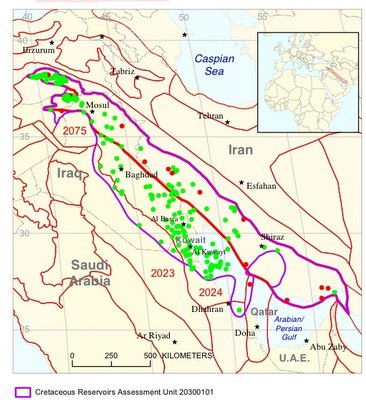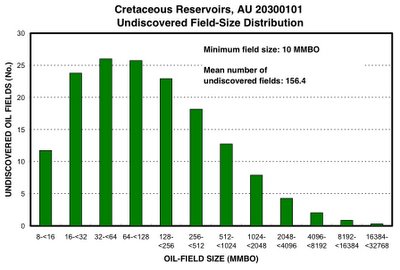228. USGS: THE MOST UNDISCOVERED OIL IS IN IRAQ
The Analysis of Assessment Results section of the USGS World Petroleum Assessment 2000 is packed with geological information relevant to the peak oil issue.
Here's one eye-opener. The USGS estimates that the Assessment Unit (AU) with the largest amount of undiscovered oil is Cretaceous Reservoirs (AU no.: 20300101) with 74 Gigabarrels (mean).
Dialing up 20300101, we get the map (click to enlarge):

Yup, you guessed it. Iraq. Plus Kuwait and Western Iran.
This goes a long way to explaining the discrepancy between the large USGS estimates of oil to be discovered, and the lack of recent discoveries. The #1 candidate for new oil is NOT BEING EXPLORED AT ALL.
Here's another interesting wrinkle. The peak oilers often point out the poor discovery record in recent years for "supergiant" oilfields (exceeding 5 Gbarrels). But consider the USGS's estimate of the size distribution of undiscovered fields in this AU:

As you can see, the vast majority of the undiscovered fields are expected to be small (although the USGS does estimate that about 4 supergiant fields still remain to be found in this AU).
If 4 supergiant oilfields in this AU strikes you as a deluded dream, consider this: In 2001, after the USGS assessment was completed, the Azadegan field was discovered in Iran Source. This is a 26 Gigabarrel supergiant covering 520 sq km, and is the largest field discovered in Iran in 30 years Source. So where is Azadegan? Yup, you guessed it -- AU 20300101:

Then, in 2003, Iran announced the discovery of an even bigger field (38 Gigabarrels), near the Persian Gulf port of Bushehr, which (of course) lies in AU 203000101.
So, right there you can see the merit of the USGS approach. Their expected undiscovered oil volume for the AU was 74 Gigabarrels, and within a few years of the study, the Iranians found 64 Gigabarrels in the AU without even breaking a sweat. If anything, the USGS underestimated the potential of this AU. Also, these facts don't jibe at all with the peak oiler mantra that "the largest fields are always found first", or with Matt Simmons' simplistic fairy tales about kings, queens and lords.
Finally, if you were to use the Colin Campbell method to estimate yet-to-find oil in Iraq, you would have to extrapolate the past discovery trend. But that's a bit of a problem because Iraq doesn't even have a discovery trend. In the case of Iraq, the recent discovery trend tells you a sum total of NOTHING about how much undiscovered oil still remains in the ground.
-- by JD

11 Comments:
JD:
Read your source a bit more carefully, you have to realize that the quoted numbers are Oil In Place. Ultimately recoverable oil will be much less. Typically only 30% or so of oil in place can be produced.
With a combined oil in place of 64 giga barrels, times 30%. The ultimate recoverable amount is 19.2 giga barrel. The whole world consumes more than 30 giga barrel per year. So Iran's discovery is only good to supply the world for another 7 or 8 months. You need to have one Iranian scale discoveries every 8 months to just break even.
One could also speculate that Peak Oil is just another nefarious meme designed to justify a rise in price.
That does seem to be the new theory Matt is flogging. He's been telling us all along that Iraq was a booty raid to get the oil. Now, he's flip-flopped 180 degrees, and is telling is that Iraq was a raid to make sure we don't get the oil.
As if we needed Matt to tell us that. Joe Sixpack on the street has been saying all along that peak oil is a conspiracy to jack up oil prices, and line the pockets of the oil companies. Now Matt apparently agrees with him. That's a funny little implosion of "peak oil theory" right there.
Matt Savinar wrote:
Characterizing people like me as "doomers" and "dead-enders" (to borrow JD's phrase) is a straw-man argument. You're creating it in and of yourself.
Matt Savinar also wrote:
Civilization as we know it is coming to an end soon.
And:
As we slide down the downslope slope of the global oil production curve, we may find ourselves slipping into what some scientists are calling a "post-industrial stone age."
Nice spin job, Matt, but unfortunately most people regard the end of civilization, the collapse of the global monetary system and a post-industrial stone age as "doomer" scenarios. YMMV
Matt Savinar wrote:
With your permission, I would like to make use of the first couple of paragraphs of post 228. I will, naturally, credit you and post a link to this blog.
No problem, Matt. Permission granted. Don't forget the link.
This is an excellent posting JD. I amd definitely impressed.
I have to also admire the persistence of doom-seekers such as Matt, who simply cannot let go of an idea once it grabs hold.
Personally, I believe the future of liquid transportation fuels lies in the biofuels sector. The Energy Blog reports on a study from UC Berkeley that shows an incredibly high energy yield from cellulosic ethanol. There will be a lot of coffee spewing from the noses of "energy experts" when they finally understand what the study means.
Roland said:
"3000 calories a day
= 1095000 calories a year
= 10950000 calories of fossil fuels a year
10950000 = 43,453.112
1 gallon of diesel = 139,000 btus
So 10950000 calories = approximately .3 gallons"
Clearly you have confused the unit Calory. The Calory in terms of metabolism of bodies is defined differently from that in thermodynamics. One Calory absorbed by the body, is actually 1 kilo-calory in the physics units, or 4185.5 Joules. There is a 1000 times difference. Clearly when you talk about 3000 Calorie a day for the human body, you are not talking about the physical unit of Calory. If it were physical unit, that is only 3000 x 4.1855 Joules = 12557 Joules. Or corresponding to lifting a 50 pounds bag one meter for 55 times. Typical physical activity of a human being per day is much more than that.
After correcting the 1000 times disprepancy, you will be talking about 300 gallons per year, which is more close to the actual figure.
Quantoken
Chris:
Roland's calculation is based on 3000 Calories per day, for a real fatty adult male. Not all westerners are that fatty after all, a more realistic figure is 2000 Calories per day. That slashes the figure for 6.5 billion people to 30 bliion barrel per year. About in par with the total oil consumption today.
Next, "each one calories in food requires 10 calories of fossil fuel energy to produce". But that 10 calories (10 kilocalories actually) do not all come from oil, it could be from coal (electricity usage) or from natural gas (making fertilizer).
Finally, most of the 6.5 billion people do NOT live the western way, in which all foods are produced industrily and purchased from grocery stores (ever American farmers buy their daily food from grocery stores!!!). In most part of the world, the food source of people are much less industrialized. An African who lives on the meat of wild animals he hunt down, for example, consumes no fossil fuel in his food structure.
But it remains true that in our part of the world, it is indeed true that each calory of food costed us 10 calories in fossil fuel.
Quantoken
Chris:
Consider that Americans consume 21 million barrels per day, and so 30 barrels per person per year. At 2000 Calories per person per day, the fossil fuel consumption for food production would be 4.7 barrel per person per year. Comparing that to the 30 barrel total per person per year, that does seem like a very realistic number.
On the other hand, if one eats 2000 Calories instead of 3000 calories per day, he/she will have saved 100 gallons of oil per year by reducing food intake. That's more than you can save by driving a Prius. So eat less is a way to conserve.
Quantoken
Roland:
It doesn't matter from which specific type of fossil fuel you get your energy from, it's all the same. When supply of one type of fossil fuel is tight all types of fossil fuels are equally tight. When you see Natural gas and oil price goes skyrocketing, isn't true that coal price also has doubled or trippled, as well. You don't notice it because you were not purchasing coal.
The problem with the world's food supply is that it is not distributed evenly. Just as people in rich countries eat too much and become too fat, people in poor countries are dying due to malnutrition. As the oil crisis fully kicks in you are going to see massive die off.
Food CAN be produced without fossil fuel. But without fossil fuel, food can NOT be produce in enough abundance to feed the world's population, especially as people in rich country want to eat meat and hence consume a much larger portion of the grain productions.
Great post, sameu. Welcome to POD. :-)
I'm probably a bit late here and I'm going to respond to the post rather than all the preceding comments.
While I think there is a great deal of unrecognised oil under Iraq, I think its wrong to say it hasn't been explored for - it was all discovered decades ago and its existance is well known (even if not officially counted in a lot of mainstream reserve tabulations).
I've ranted about this at length in the past - have a look at some of these posts:
http://peakenergy.blogspot.com/2005/08/greatest-prize-of-all.html
http://peakenergy.blogspot.com/2005/05/control-of-oil.html
http://peakenergy.blogspot.com/2005/06/how-much-oil-does-iraq-have.html
http://peakenergy.blogspot.com/2005/06/more-on-iraqi-oil.html
Post a Comment
<< Home